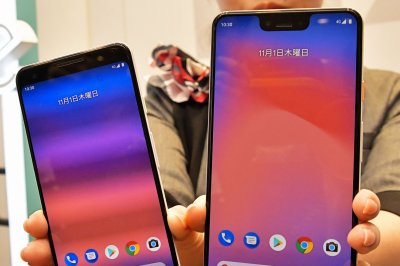
It was found that Google paid advertising revenue to Android makers as part of its contract deals. File Photo by Keizo Mori/UPI | License Photo
April 15 (UPI) — The Japanese Fair Trade Commission on Tuesday issued Google a cease-and-desist order for violating anti-monopoly law by allegedly striking deals with Android manufacturers to preinstall Google apps.
“By binding smartphone manufacturers and telecommunication carriers, Google has made it difficult for other competing search engine applications to be used on Android phones,” stated Saiko Nakajima, a JFTC senior investigator for digital platform operators.
It’s the first time Japan has ever issued such an order on any major U.S.-based tech giant like like Google with its other contemporaries like Apple, Meta, Amazon or Microsoft.
According to Japan’s FTC, Google allegedly struck deals with at least six Android smartphone manufacturers that produce about 80% of Android’s in Japan to install Google Play and Google Chrome apps and put them in home screen locations easy for users to access.
In addition, it was found in the investigation starting October 2023 that Google paid advertising revenue to Android makers as part of its contract deals.
“In the process of this investigation, the JFTC exchanged information with overseas competition authorities that investigated Google LLC’s act similar to this case,” the commission’s cease-and-desist order states.
The commission says this took place at least from July 2020 to the present day.
“Google’s conduct in this case has created a risk of impeding fair competition concerning transactions — thus, we have determined that this is an act in violation of the Antimonopoly Act,” added the JFTC’s Nakajima.
The Japanese authority’s cease-and-desist order bars Google from asking companies to preinstall its apps, calls for a compiling of guidelines for compliance action and instructs the global tech leader to stop committing acts in violation of Japanese anti-monopoly laws.
The commission previously said Google already owns about a 90% share of the search market.
JFTC officials hope it will encourage greater competition in Japan’s search engine market for its more than 123 million citizens.
Google is liable to a fine if it does not adhere to the order.
In August, U.S. District Court Judge Amit Mehta called Google a “monopolist” in a similar ruling, saying it “has acted as one to maintain its monopoly.”
Meanwhile, the order comes as a Japanese delegation led my Economy Minister Ryosei Akazawa is set to visit Washington to talk over U.S. President Donald Trump‘s sweeping global tariffs.